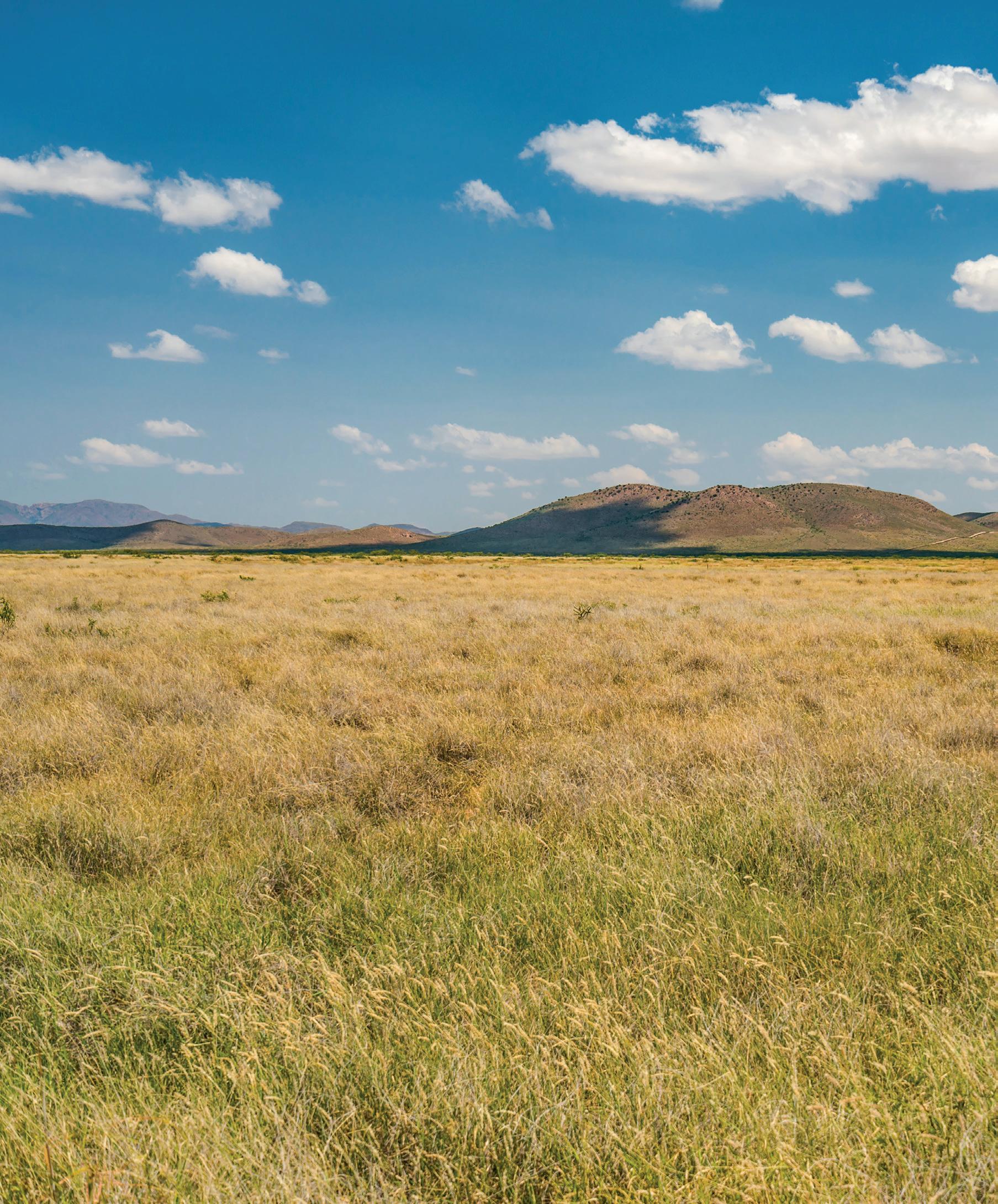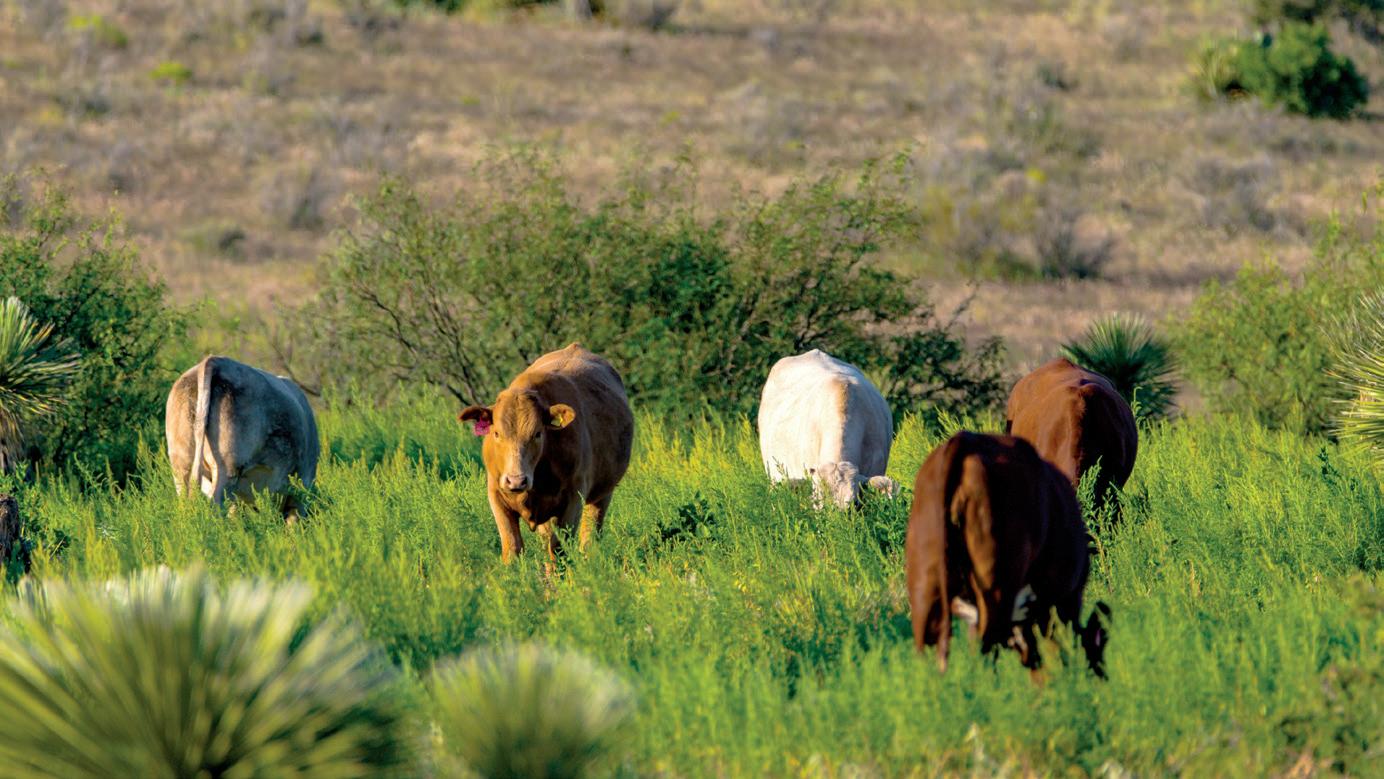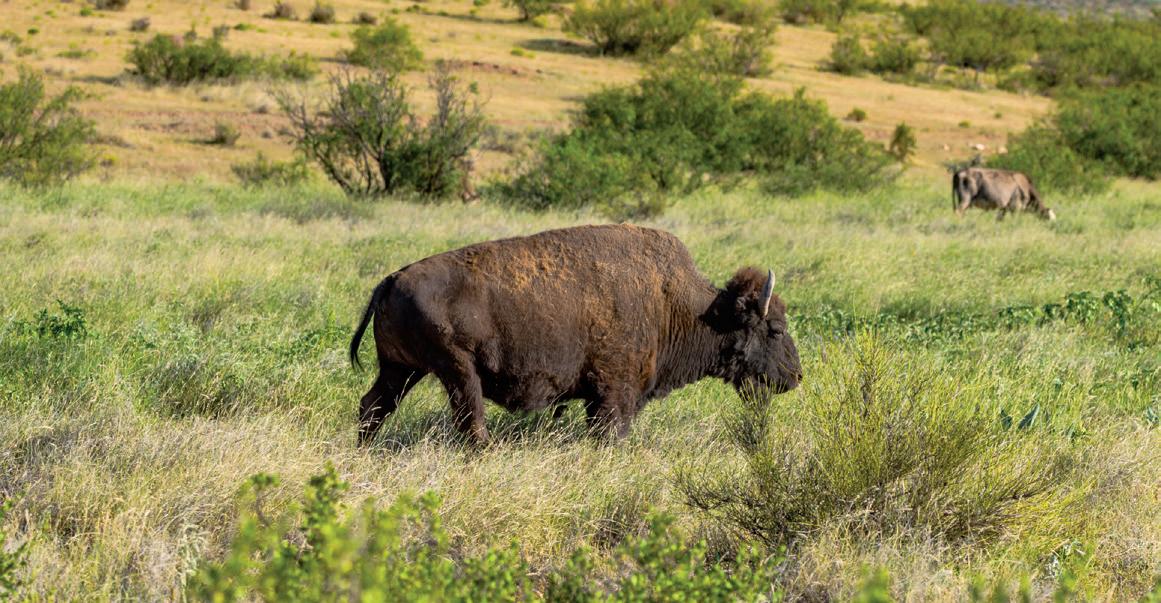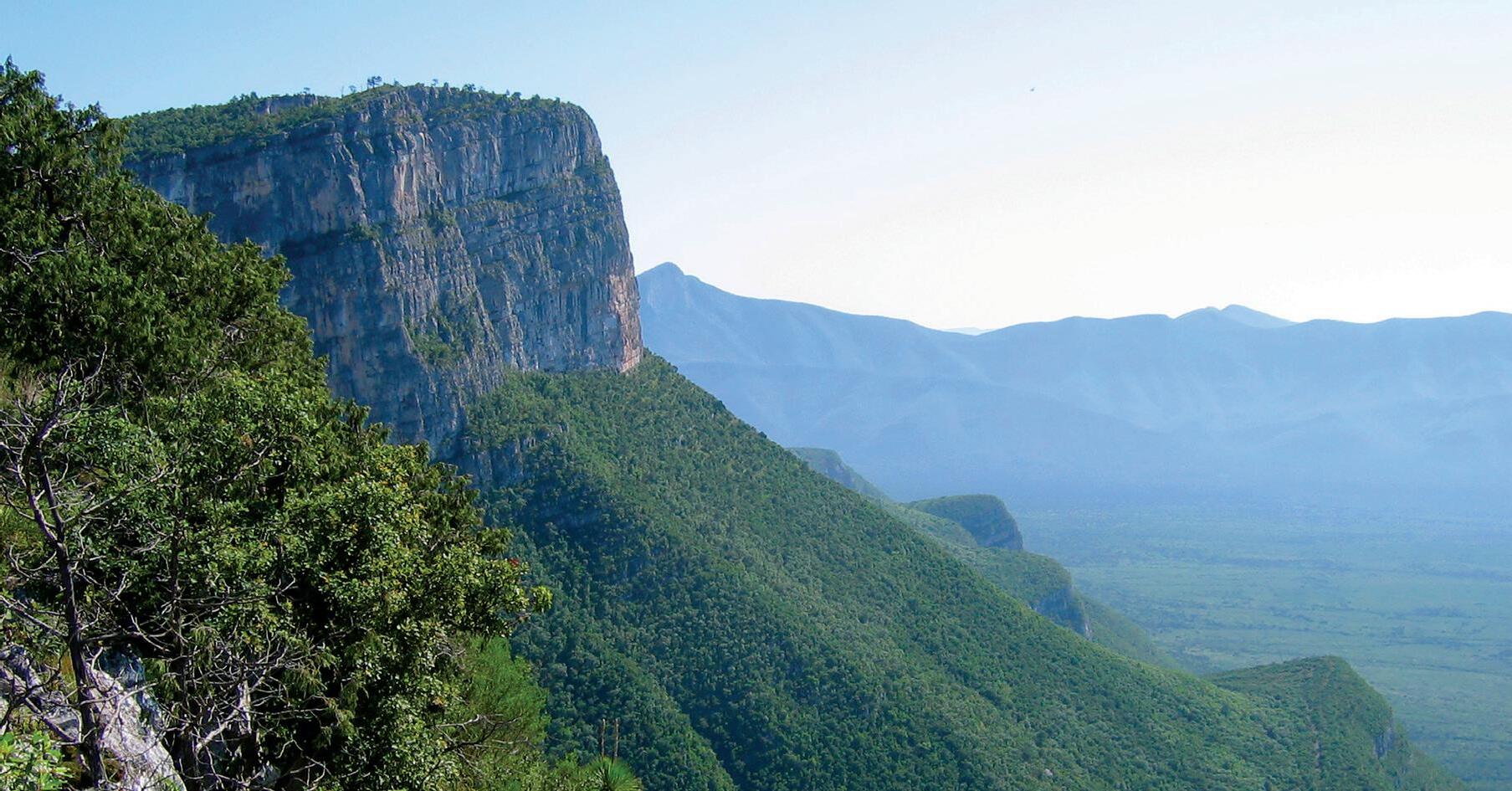
9 minute read
Mexico Ripe with Ranching Potential
from LAND Summer 2023
Mexico Ripe with Ranching Potential
STORY BY LORIE A. WOODWARD

Mexico is a land ripe with potential for ranching
“Mexico is pro-agriculture,” said James “Jim” Sammons III, a broker associate with Briggs Freeman Sotheby’s International Realty in Dallas who hails from a multi-generation Texas ranching family and lived and ranched in Mexico from 1985–1991. “Currently, the Mexican peso is one of the strongest currencies in the world, which just demonstrates the country’s economic strength. World financial players perceive Mexico as stable and foreign investment is pouring in.”

From a ranching standpoint, Mexico’s northern states offer several advantages, Sammons said. Perhaps, the largest is ready access to both the U.S. and Mexican cattle markets.
“Ranches in Northern Mexico are generally priced in U.S. dollars because most of their income comes from selling their steers in America for dollars,” Sammons said. “With the present state of the Mexican peso, the prices for the cattle sold into the Mexican market are still the same, but ranchers get more than 12 percent more dollars for the pesos they receive.”
In addition, the growing season is long, the regulatory environment is less onerous, labor including experienced cowboys is more readily available. Plus, the overall cost of operation is generally less than in America.
“There are opportunities available for people who are willing to adapt to the local way of doing business,” said Sammons, who has been involved in Mexican land transactions for more than 30 years and is currently marketing several Mexican ranches, ranging from 15,000 acres to more than 80,000 acres. “Mexico is different. Before you pick up and move, it's imperative to ascertain your own willingness to change because the country, be it Mexico or anywhere else, isn’t going to change for you.”
Sammons and his partners ranched in the state of Coahuila. From his perspective, Coahuila along with the other northern states of Chihuahua and Sonora are the most suitable for American operations. Not only do they provide abundant natural resources and the most direct access to the U.S., but the people are also more familiar and more aligned with American “norms.”
“Overall, the Mexican culture is more formal and more respectful than that of modern America,” Sammons said. “The Mexicans are warm, wonderful people who take great pride in their country, value family and friends and really enjoy life.”
He, speaking of his own family’s experience, continued, “Instead of being Americans living in Mexico, we wanted to live like our Mexican neighbors. We learned to slow down and savor what is important, so it was a rich and rewarding experience.”
Ranching in Mexico
Northern Mexican ranches have similar grasses and climate to their counterparts across the border, so management strategies for grazing and brush control are similar, Sammons said. In Mexico, a lot of the cattle work is still done on horseback.
On Mexican ranches, raising livestock is the primary focus. Although many ranches have prime wildlife habitat, generally hunting is a recreational pursuit reserved for family and friends.
“People are just beginning to develop hunting with an eye toward business, so there are great opportunities to purchase Mexican ranches that are easy to access from the U.S. and have existing family and friends hunting operations,” Sammons said. “These cattle ranches can easily be expanded to include hunting as a business that caters to paying clients, be they individuals or corporations that want to entertain their business associates.”
Just as in America, cattle are shipped from the ranches to the markets via potbellied trucks. Because of health regulations, Mexican steers can go north, but the females, unless they are spayed, are confined to the Mexican market.
“To make the transition as seamless as possible, I recommend that people have a Mexican partner or at least a Mexican mentor who is well-versed in the land and cattle business,” Sammons said. “Having locals who know the local people and local ways cut down on the learning curve and prevent unnecessary mistakes.”
When possible, he suggests hiring people from the local community to work in your business.
“It creates a network and goodwill,” Sammons said. “Mexicans are very ingenious and resourceful; they figure out how to use what they have to make things work in a way that former generations of Americans did.”
Another must-have is a set of CPAs: a Mexican and an American one, if you’re operating out of the United States.
“It’s crucial that you have a team of people who make sure that you stay in compliance, especially if you are dealing in the export market,” Sammons said.
For people who don’t speak Spanish well or at all, be prepared to learn by immersion. Sammons, who started life on the border near Van Horn and spent his first year in school delivering his lessons in both English and Spanish, thought his mastery of the language was greater than it turned out to be.
“For two years, I carried around a SpanishEnglish dictionary and a Spanish farm dictionary, so I could communicate effectively,” Sammons said. “I spoke Tex-Mex, which I quickly learned is different than true Spanish.”
On the ranch and in local communities, security is a matter of common sense. In the states where he works regularly, Sammons said that it is more peaceful than it has been in years. Violence against people outside the blackmarket industries has decreased significantly.
“It’s no secret that there are parts of Mexico, just like in any other country, where it’s not smart to go,” Sammons said. “The rest of it is a matter of common sense. Pay attention to where you are and who you are with. People who go to bars after dark and drink too much are asking for trouble.”

Buying Land in Mexico
Ranches in Mexico are getting smaller, but fragmentation is a relative concept.
“While Mexican ranches are smaller than they once were, they are not being sub-divided as quickly or as small as their counterpart properties in America,” Sammons said. “Large acreages are still widely available.”
When it comes to acreage Americans and other non-residents are subject to the same limits as Mexicans.
“Many Americans, especially those whose families may have dealt with Mexico prior to the 1990s, still hold outdated ideas about Mexican land ownership,” Sammons said. “The former limitations on where and how much land nonMexicans can own are no longer a consideration because those post-revolutionary laws were repealed and replaced 30 years ago.”
In Mexico, very few of the land transactions involve financing. Most are cash deals, so things such as title insurance are not required. The buyers and sellers generally hire local appraisers and surveyors. Whether the buyers or sellers cover the cost of the services is subject to negotiation.
“Many of the ranches have surveys in place, but technology has gotten much more sophisticated since most were conducted,” Sammons said. “It can be beneficial to have a current survey.”
Landowners can own the mineral rights in Mexico, but the taxes make it prohibitively expensive. According to Sammons, production is very limited, so the tax burden generally outweighs the potential upside.
Brokers do not have to be licensed in Mexico. Unlike America, the brokers do not write the contract. Instead, the contract and all other phases of the transaction are handled by a “notario publico,” an attorney who specializes in land deals.
“All notarios are attorneys, but not all attorneys are notarios,” Sammons said. “The notarios handle all the research and the paperwork to get the deal ready to close. They also figure out the taxes, which are payable on closing. It’s a very simple, but efficient process.”
Once the transaction is completed, the deed is filed with the Registro Público de la Propiedad, the Public Registry of Property.
If the time comes to sell, there are no restrictions or extra fees for non-Mexican landowners. The only special consideration is ensuring your CPA has a good grasp of international taxes, so everything is covered, Sammons said.
In the final analysis, land in Mexico is worth seriously considering, especially for those interested in production agriculture, Sammons said. To that point, Sammons recalled a piece of advice he received while operating in Mexico. It became a personal litmus test when considering an opportunity.
He was running some ideas past his mentor, a successful Mexican cattleman who was at least 30 years older than Sammons. At the end of his brainstorming, Sammons remarked, “But I’m not going to just jump off into something.”
To which, the older gentlemen replied, “But maybe you should.”
And when it comes to buying land in Mexico, Sammons suggests maybe you should, too.

Questions to Ask Yourself Before Buying Land in Mexico
While Sammons is a proponent of land ownership in Mexico, it isn’t for everyone. Through the years, he’s formulated a list of basic questions that everyone needs to ask themselves before purchasing land.
1. How comfortable am I operating in an unfamiliar culture?
2. How willing am I to adapt to new ways of doing things?
3. How will I manage the property? Will I live there full-time or be an absentee landowner?
4. How will I get to the ranch? Drive? Fly? If it’s the latter, what facilities are on the ranch to accommodate that?
5. What is the ranch’s production level? Is there any room for improvement?
6. Who are the neighbors?
7. Where is the nearest community? How far do I have to go to get necessary supplies?
8. What is the local availability of labor? Where can I get help?










